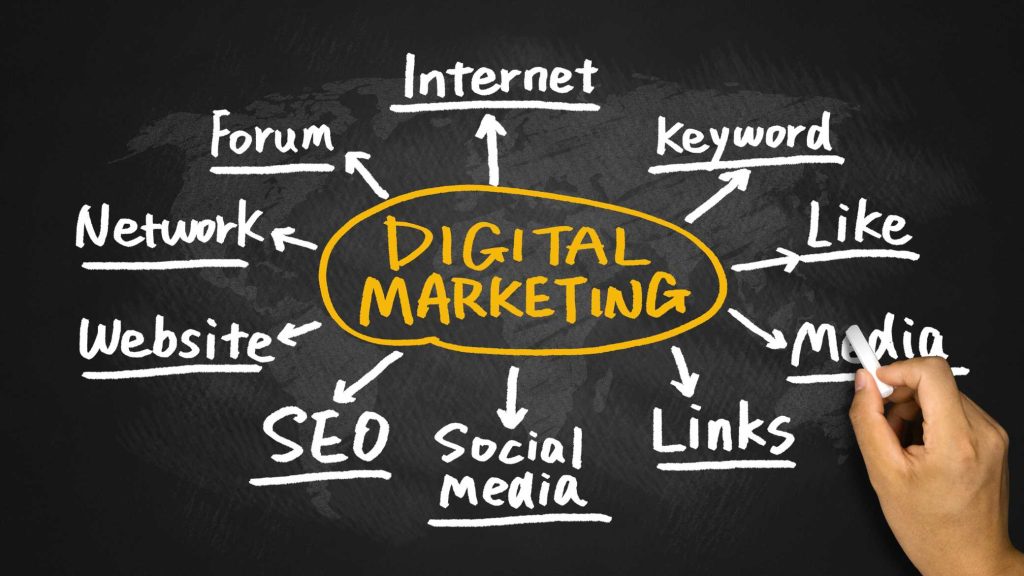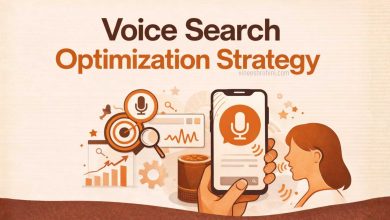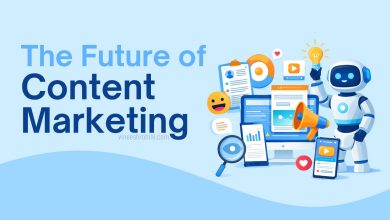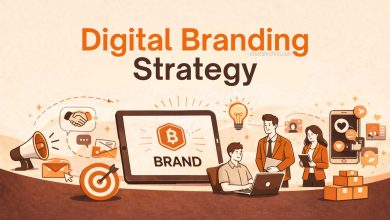Digital Marketing Beginners Guide in 2025: A Comprehensive Roadmap
Digital Marketing Beginners Guide in 2025: Digital marketing has rapidly become an essential element for businesses of all sizes in the modern world. In 2025, with millions of people browsing the internet daily, businesses are increasingly focusing on digital channels to connect with their target audience. Whether you’re starting a new business, managing an existing one, or looking to switch careers into digital marketing, it’s crucial to understand how this evolving landscape works.
Table of Contents
This comprehensive guide is designed to introduce beginners to the world of digital marketing. By the end, you’ll have a solid understanding of key concepts, strategies, and tools that can help you thrive in the digital space.
What is Digital Marketing?

Digital marketing refers to the use of the internet and online-based digital technologies, including computers, mobile devices, and other digital media platforms, to promote products or services. Unlike traditional marketing, digital marketing is all about connecting with customers through digital channels such as websites, search engines, social media platforms, email, and mobile apps.
At its core, digital marketing is about creating awareness, building relationships, and driving sales through effective use of online platforms.
Read more: 10 Benefits of Digital Marketing in 2025 : Comprehensive Guide
Why Digital Marketing is Crucial for Beginners in 2025
In 2025, digital marketing is no longer optional; it’s essential for any business or individual looking to establish a presence and reach a broad audience. The rapid increase in internet usage, particularly mobile internet, has created a unique opportunity for businesses to communicate with their target audiences more effectively and personally than ever before.
- Global Reach: Digital marketing allows you to reach a global audience, unlike traditional marketing that has geographical limitations.
- Cost-Effectiveness: Digital marketing is often more affordable compared to traditional forms of advertising like TV, radio, or print.
- Real-Time Analytics: You can track and measure the performance of your campaigns instantly, allowing for continuous optimization.
- Personalization: Digital marketing enables you to deliver personalized content and ads based on user behavior, preferences, and demographics.
For those just starting, digital marketing provides a level playing field where even small businesses can compete with larger enterprises.
Key Elements of Digital Marketing for Beginners

Digital marketing encompasses a variety of strategies, each serving a different purpose. Let’s break down the most important areas you need to know:
1. Search Engine Optimization (SEO)
SEO is the process of optimizing your website and content so that search engines like Google can easily find and rank it higher in search results. The higher your website ranks for relevant search queries, the more traffic it will generate.
Key SEO Components:
- On-Page SEO: Optimizing individual pages of your website (e.g., using relevant keywords, creating high-quality content, and improving user experience).
- Off-Page SEO: Building backlinks from reputable websites to increase your site’s authority.
- Technical SEO: Ensuring that your website is technically optimized, with fast load times, a mobile-friendly design, and proper indexing.
For beginners, a great starting point is to focus on keyword research—understanding the terms and phrases your potential customers are using to search for your products or services.
2. Pay-Per-Click (PPC) Advertising
PPC is a form of online advertising where you pay each time a user clicks on your ad. The most common platform for PPC is Google Ads, but social media platforms like Facebook, Instagram, and LinkedIn also offer advertising options.
In PPC campaigns, you bid on relevant keywords, and your ad appears in the search results or as a display ad when users search for or browse related content. A well-optimized PPC campaign can quickly drive targeted traffic to your website.
Pro Tips for Beginners:
- Start small and experiment with your ads.
- Focus on targeting a specific audience for better results.
- Regularly monitor and optimize your campaigns to ensure you’re getting the best ROI (Return on Investment).
3. Content Marketing
Content marketing is all about creating valuable and relevant content to attract, inform, and engage your target audience. The goal is not to directly sell but to provide helpful, informative, or entertaining content that builds trust with your audience.
Types of Content:
- Blog Posts: Write informative articles to solve problems or answer questions your target audience may have.
- Videos: Use video content to engage users visually. Platforms like YouTube, TikTok, and Instagram are powerful for visual content.
- Infographics: Visually represent complex data or processes in a simplified, easy-to-understand format.
- eBooks and Guides: Create long-form content like eBooks or downloadable guides to build authority in your industry.
For Beginners: Start by maintaining a blog on your website. Regularly post helpful articles that are optimized for SEO and provide genuine value to your readers.
4. Social Media Marketing
Social media platforms like Facebook, Instagram, Twitter, LinkedIn, and TikTok offer businesses an unparalleled opportunity to connect with their audience directly. Social media marketing involves creating and sharing content to engage with followers and build relationships.
Types of Social Media Marketing:
- Organic Social Media: Posting content regularly, engaging with followers, and sharing news or updates without paid advertising.
- Paid Social Media Advertising: Running ads on platforms like Facebook Ads or Instagram Ads to reach specific audiences.
For Beginners: Choose 1-2 platforms that are most popular among your target audience. Focus on creating engaging, shareable content and growing your following.
5. Email Marketing
Despite the rise of social media and mobile apps, email marketing remains one of the most effective ways to communicate directly with your audience. It allows you to nurture leads, announce new products, promote sales, and keep your audience informed.
Key Email Marketing Techniques:
- Personalization: Use the recipient’s name and tailor content to their preferences.
- Segmentation: Group your email list into segments based on demographics or behavior for more targeted campaigns.
- Automation: Set up automated email campaigns, such as welcome emails, abandoned cart emails, or follow-up sequences.
For Beginners: Start building an email list by offering incentives like discounts or downloadable resources in exchange for email sign-ups.
6. Influencer Marketing
Influencer marketing involves partnering with influencers—individuals who have a large following on social media or other online platforms. They can help promote your products to their audience, often driving traffic and sales.
For Beginners: Collaborate with micro-influencers who have smaller, highly engaged audiences. Micro-influencers often charge less and can deliver a higher ROI.
7. Affiliate Marketing
Affiliate marketing is a performance-based marketing model where you promote other companies’ products or services on your website or social media. You earn a commission every time someone makes a purchase through your referral link.
For Beginners: Join affiliate programs related to your niche and start promoting products you believe in. It’s an excellent way to earn passive income.
Buy now: Premium Digital Marketing E-Books
Tools Every Digital Marketing Beginner Should Use

The right tools can streamline your efforts and make your digital marketing strategy more effective. Here are a few beginner-friendly tools to help you:
- Google Analytics: Track and measure your website’s traffic and performance.
- Canva: Create professional-looking graphics and visuals for your content.
- SEMrush: Conduct keyword research, track rankings, and analyze competitors.
- Mailchimp: Set up and manage email campaigns, automate sequences, and track performance.
- Buffer: Schedule and manage social media posts across multiple platforms.
How to Get Started in Digital Marketing: A Step-by-Step Guide

Digital marketing is a dynamic field with endless opportunities for creativity, innovation, and career growth. Whether you’re looking to build a business, boost your personal brand, or start a rewarding career, this step-by-step guide will help you navigate the path to success.
Step 1: Understand the Basics of Digital Marketing
Before diving in, familiarize yourself with the fundamentals:
- What is digital marketing? It’s promoting products or services using digital channels like search engines, social media, email, and websites.
- Key components:
- Search Engine Optimization (SEO)
- Pay-Per-Click Advertising (PPC)
- Content Marketing
- Social Media Marketing
- Email Marketing
- Affiliate Marketing
- Analytics and Reporting
Step 2: Identify Your Goals
What do you want to achieve?
- Are you looking to promote a business?
- Do you want to grow as a freelancer or land a full-time job in digital marketing?
- Your goals will guide your focus areas and learning priorities.
Step 3: Learn the Core Skills

Mastering the core skills is essential for success:
- SEO: Learn how to optimize websites for search engines. Tools like Google Analytics, Ahrefs, or SEMrush are great for understanding SEO performance.
- Content Creation: Practice creating high-quality, engaging content for blogs, videos, and social media.
- Social Media Management: Understand how to grow and engage audiences on platforms like Facebook, Instagram, LinkedIn, and Twitter.
- Paid Advertising: Learn how to create and manage campaigns on Google Ads and social media platforms.
- Analytics: Familiarize yourself with tools like Google Analytics and Google Data Studio to measure campaign performance.
Step 4: Take Online Courses
Invest in your learning with online courses. Some great platforms include:
- Coursera
- HubSpot Academy
- Google Digital Garage
- Udemy
- LinkedIn Learning
Step 5: Build Your Portfolio
Start small by working on personal projects or helping friends or local businesses. Document your work, results, and learnings to showcase your expertise.
Step 6: Stay Updated on Trends
Digital marketing evolves rapidly. Stay ahead by:
- Following industry blogs (e.g., Neil Patel, Moz, Search Engine Journal).
- Subscribing to newsletters like HubSpot and MarketingProfs.
- Engaging in forums and communities like Reddit’s r/digital_marketing.
Step 7: Practice and Experiment
Apply your knowledge in real-world scenarios:
- Create your own blog or website.
- Run a small ad campaign.
- Experiment with different strategies to see what works.
Step 8: Network with Professionals
Attend webinars, workshops, and meetups to connect with experienced digital marketers. Building relationships can lead to mentorship opportunities and job offers.
Step 9: Start Freelancing or Interning
Gain hands-on experience by offering your services as a freelancer or interning with companies. Platforms like Fiverr, Upwork, and Freelancer are great places to start.
Step 10: Get Certified
Enhance your credibility with certifications, such as:
- Google Ads Certification
- HubSpot Content Marketing Certification
- Facebook Blueprint Certification
- SEMrush SEO Toolkit Certification
Step 11: Create a Personal Brand

Leverage social media platforms like LinkedIn to build your personal brand. Share your knowledge, insights, and achievements to establish yourself as an authority in the field.
Buy now: Premium Digital Marketing E-Books
Conclusion
Digital marketing is an exciting and ever-evolving field. In 2025, with advancements in AI, mobile-first strategies, and data-driven decision-making, digital marketing will only become more impactful. By understanding the basics of SEO, PPC, content marketing, social media, and other key areas, beginners can set themselves up for success in this dynamic industry.
No matter your background, starting with a solid foundation and continuously learning and adapting will help you grow and succeed. Digital marketing is a long-term game, but with patience, persistence, and the right strategies, you can build a strong online presence and reach your business goals.
Keyword: Digital Marketing Beginners Guide 2025



